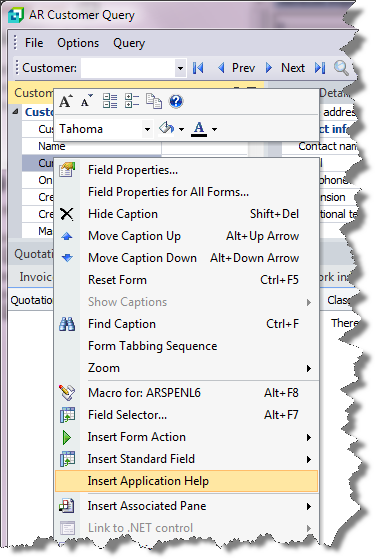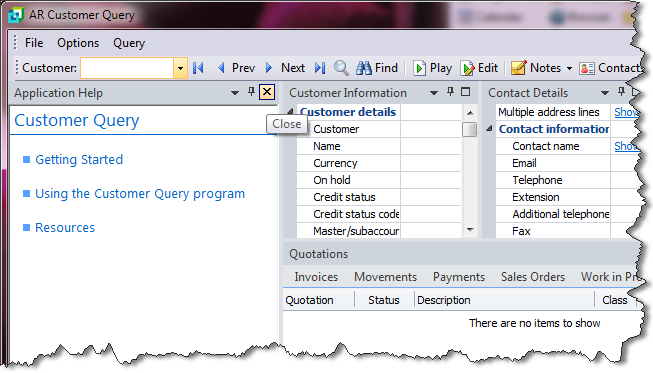You use this program to maintain budgets for requisition user groups.
Requisition budgets are defined at stock code or product class level within each group and can be defined in terms of value or quantity (Purchase Orders Setup).
| Field | Description |
|---|---|
| New | Select this to add a budget for the current requisition group. |
| Delete |
Select this to delete the budget for the currently displayed requisition group. See Activity considerations in Notes and warnings. |
| Save | Select this to save the details you entered or changed. |
| Distribute | Enter an amount and to distribute this over the various months. |
| Requisition Group | Indicate the requisition group for which you want to enter budgets. |
| Year |
Indicate the year for which you want to enter the budgets. The year defined here represents a calendar year, not your financial year. You can only define budgets for the previous year, the current year or a future year. |
| Product Class | Indicate the product class for which you want to enter
the budgets. This specifically applies if you selected to define requisition budgets At product class level (Purchase Orders Setup - Requisition tab). However, if you selected to define requisition budgets At stock code level (Purchase Orders Setup - Requisition tab), then you can define budgets for non-stocked items by entering a product class without entering a stock code. |
| Stock Code | Indicate the stock code for which you want to enter the
budgets. This applies if you selected to define requisition budgets At stock code level (Purchase Orders Setup - Requisition tab). You can enter a product class and leave this field blank to define budgets for non-stocked items. If you selected to define requisition budgets At product class level (Purchase Orders Setup - Requisition tab), then you can enter a stock code together with the product class, to define a budget for a specific stock code within the product class. |
This screen is displayed when you select the Distribute function.
| Field | Description |
|---|---|
| Group | This indicates the group to which you are applying the budget. |
| Product class | This indicates the product class to which you are applying the budget. |
| Stock code | This indicates the stock code to which you are applying the budget. |
| Year | This indicates the year to which you are applying the budget. |
| Method | |
| Divide amount equally |
Select this option to divide the amount entered evenly by the 12 months in the year. For example, if you entered an amount (or quantity) of 12 000 in the Amount field, then each month would have a budget of 1 000. |
| Repeat amount across all periods |
Select this to repeat the amount/quantity entered in the Amount field in each month. For example: If you entered an amount (or quantity) of 10 000 then each month would have a budget of 10 000. |
| Amount |
Enter the budget amount or quantity you want to distribute. TheAmount field represents a value or a quantity, depending on whether you selected Expressed in terms of value or Expressed in terms of quantity (Purchase Orders Setup - Requisition tab - Requisition budgets). This amount/quantity can represent either the annual amount (if you are dividing the amount equally) or the monthly amount (if you are repeating the amount across all periods). |
| OK | Select this to distribute the amount entered to the 12 months for the selected year. |
| Cancel | Select this to ignore any changes you made and to return to the previous screen. |
| Field | Description | ||||
|---|---|---|---|---|---|
| Budget information | |||||
| Group | This indicates the requisition group for which you are defining budgets. | ||||
| Product class | This indicates the product class for which you are defining budgets. | ||||
| Stock code | This indicates the stock code for which you are defining budgets. | ||||
| Year | This indicates the year for which you are defining budgets. | ||||
| Budgets |
|
||||
| January - December | Iindicate the budget amount or quantity for each month
for the entire group (i.e. the entry for each month represents
the budget for all users belonging to the group in total and
not the budget for each user in the group). Your entries in these fields represent a value or a quantity, depending on whether you selected Expressed in terms of value or Expressed in terms of quantity (Purchase Orders Setup - Requisition tab - Requisition budgets). You can use the Distribute function to enter an amount and to distribute this over the various months (see Distribute Amount). |
||||
This is displayed when you select the Copy option from the Browse on Group Budgets program.
| Field | Description |
|---|---|
| Group | This indicates the requisition user group from which you are copying budgets. |
| Product class | This indicates the product class from which you are copying budgets. |
| Stock code | This indicates the stock code from which you are copying budgets. |
| Year | This indicates the year from which you are copying budgets. |
| Group | Indicate the requisition user group to which want to copy budgets. |
| Product class | Indicate the product class to which want to copy budgets. |
| Stock code | Indicate the stock code to which want to copy budgets. |
| Year | Indicate the year to which want to copy budgets. |
| OK | Select this to copy the budgets according to your selections. |
| Close | Select this to ignore any changes you made and to return to the previous screen. |
-
Before you can define your requisition budgets, you need to define your requisition groups (Requisition Group Maintenance) and attach all your requisition users to a valid requisition group (User Maintenance).
-
You can only access this program if you selected to define Requisition budgets (Purchase Orders Setup).
Operator access to the following activities within this program can be restricted. You configure this using the Operator Maintenance program.
| Activity | Description |
|---|---|
| PO Req budget deletion | Controls whether an operator can delete requisition budgets using the Group Budgets and Browse on Group Budgets programs. |
Electronic Signatures provide security access, transaction logging and event triggering. This enables you to increase control over your system changes.
Access to the following eSignature transactions within this program can be restricted at Operator, Group, Role or Company level. You configure this using the Electronic Signatures program.
| eSignature Transaction | Description |
|---|---|
| PO Requisition add budget |
Controls access to the New function in the Browse on Group Budgets and Group Budgets programs. |
| PO Requisition change budget |
Controls access to the maintenance of requisition budgets in the Browse on Group Budgets and Group Budgets programs. |
| PO Requisition delete budget |
Controls access to the Delete function in the Browse on Group Budgets and Group Budgets programs. |
Application Help Panes provide step-by-step instructions for various functions within the program, including a brief overview of what the program does, what setup options are required and how to personalize the program. The intention is that the pane provides information that is uncluttered and easy to navigate.
You can embed an Application Help Pane:
-
in the main SYSPRO menu
-
in any program with panes, if not using roles
-
when adding a role layout in Design Mode.
Inserting Application Help
You would typically follow this procedure to display help for the current program in a customized pane that can be pinned to the program window.
Information includes step-by-step instructions for the various functions available within the program, including a brief overview of what the program does, what setup options are required and how to personalize the program.
-
Open the program for which you want to insert application help into a customized pane.
This functionality is only available for a program that has panes.
-
Right-click any form field.
You can also click the triangle menu icon that appears in the title area of a pane.
-
Select Insert Application Help from the context-sensitive menu.
The application help appears in a pane within your program. You can reposition the pane using the docking stickers or pin it to the program window.
Removing the Application Help pane
If you no longer want to display application help in a pane for your current program, you can simply remove it.
-
Select the Close icon in the right-hand corner of the application help pane.
-
Confirm that you want to delete the pane.
![[Note]](images/note.png)

